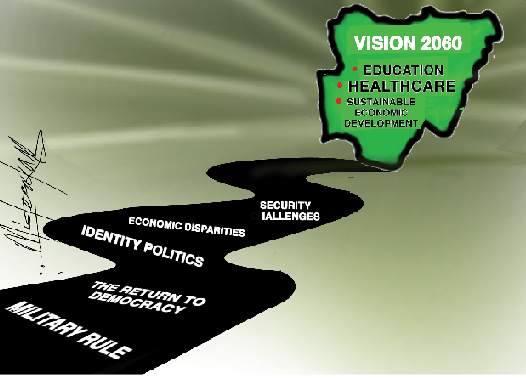As I sit here on October 1st, 2024, reflecting on Nigeria’s tumultuous history and its journey to this present day, I find myself contemplating what the future holds for this “great nation.” It’s as if I have been transported through time—from the struggles and triumphs of the past to the uncertainties of the future—specifically, to the year 2060.
Since gaining independence in 1960, Nigeria has weathered numerous storms: military rule, the return to democracy, identity politics, economic disparities, and security challenges. The early decades were filled with promise and optimism, yet marred by political instability and economic mismanagement. Military coups frequently interrupted the nation’s democratic aspirations, leading to prolonged authoritarian rule that stifled development and fostered discontent among the population.
The return to civilian governance in 1999 reignited hopes for stability and progress, but it also exposed deep-rooted issues of corruption, ethnic tensions, and inequality. Identity politics grew increasingly divisive, shaping both electoral outcomes and policy directions. Economic growth, primarily driven by oil revenues, failed to translate into widespread prosperity. Large segments of the population remained trapped in poverty, while a wealthy elite thrived.
Security challenges, ranging from ethno-religious conflicts to insurgencies in the Niger Delta and the northeast, further tested the nation’s unity and resolve. The state struggled to provide basic services and security to its citizens, exacerbating social tensions and impeding economic development.
As I embark on this imagined journey through time, I envision two starkly contrasting futures for Nigeria in 2060: one utopian, the other dystopian.
Utopia: A Beacon of African Prosperity
In this utopia of 2060, Nigeria has emerged as a beacon of African prosperity. The journey to this point was arduous, marked by decisive government reforms and visionary leadership. At the heart of this transformation was a strategic national development plan focused on economic diversification, technological innovation, and sustainable growth.
My time-travelled vision takes me to the bustling streets of Gusau in 2060, where the skyline has evolved into a symbol of Nigeria’s economic resurgence. Towering skyscrapers adorned with solar panels and green roofs reflect the nation’s commitment to sustainability. The once congested slums have given way to vibrant neighborhoods, where clean energy powers both homes and businesses.
I visit a high-tech agricultural hub in Niger State, where advanced irrigation systems ensure food security throughout the year. Farmers, equipped with smartphones and real-time access to market data, enjoy increased productivity and profitability. Agriculture has become a pillar of Nigeria’s economy and a major source of revenue.
In Abuja, the seat of governance radiates efficiency and transparency. State-of-the-art government buildings house digital archives accessible to all citizens, ensuring accountability and participation in decision-making. Public services—from healthcare to education—are universally accessible and of high quality, thanks to sustained investments in human capital and infrastructure.
Politically, Nigeria has achieved unity in diversity. Decades of inclusive policies and national dialogue have bridged ethnic and religious divides, fostering a shared Nigerian identity. Education and healthcare are prioritized, ensuring that every citizen, regardless of background, has access to quality services.
Security, once a significant concern, has been addressed through proactive measures. Modernized security forces, community policing initiatives, and robust intelligence frameworks have eliminated terrorism and insurgency. The nation thrives on a collective commitment to unity and peace.
Dystopia: Struggling Against the Shadows of the Past
Conversely, the dystopian Nigeria of 2060 reflects missed opportunities and systemic failures. Despite occasional periods of progress, the nation remains plagued by persistent challenges born of decades of mismanagement and corruption. Economic diversification remains a distant dream, stunted by short-sighted policies and global market instability.
I find myself in a neglected neighborhood on the outskirts of Uyo, where crumbling infrastructure reflects the decay of governance. Power outages are frequent, leaving residents in darkness amid the sweltering heat. Basic services such as healthcare and education are woefully inadequate, perpetuating cycles of poverty and despair.
Political divisions have deepened, fueled by identity politics and the failure to build consensus on national issues. Corruption continues to corrode institutions, eroding trust in government and stifling economic potential. Both the education and healthcare systems have faltered, unable to meet the demands of a growing population.
Security challenges persist, with sporadic outbreaks of violence and extremism threatening the nation’s stability. Law enforcement struggles to combat organized crime and internal conflicts, exacerbated by porous borders and limited resources.
Lessons from the Past, Visions for the Future
Both the utopian and dystopian visions of Nigeria in 2060 offer important lessons. The nation’s journey from independence to its centennial year has been marked by resilience, but also by missed opportunities and systemic challenges. Reflecting on my time-travelled journey, these lessons crystallize into imperatives for Nigeria’s future.
The utopian vision underscores the transformative power of leadership. Imagine a Nigeria where leaders, inspired by the successes of nations like Singapore, Rwanda, and the UAE, implement policies that spark innovation and empower the youth. Strategic investments in education, vocational training, and research institutions equip Nigerians with the skills needed for a knowledge-based economy. By fostering entrepreneurship and supporting small businesses, Nigeria cultivates a vibrant private sector that drives job creation and economic dynamism.
This utopian Nigeria envisions a society where every child, regardless of background, receives quality education and healthcare. Communities are home to modern healthcare facilities and schools equipped with cutting-edge technology. Vocational training programs align with industry needs, bridging the gap between education and employment. Sustainable development practices—from renewable energy initiatives to environmental conservation efforts—safeguard Nigeria’s natural resources for future generations.
In this future, Nigerians celebrate their diversity as a source of strength. Cultural festivals, language preservation efforts, and national reconciliation programs promote understanding and solidarity. Social safety nets, supported by robust welfare systems, ensure the vulnerable and marginalized are protected. By addressing the root causes of social tensions and promoting inclusive growth, Nigeria secures stability and resilience against external shocks.
The dystopian scenario, on the other hand, serves as a cautionary tale of what happens when institutions falter. Corruption erodes public trust, stifles economic progress, and worsens social inequalities. Inadequate infrastructure and poor services perpetuate cycles of poverty, creating fertile ground for unrest and extremism. To prevent this, Nigeria must prioritize institutional reforms that uphold the rule of law, protect human rights, and promote equitable development across all regions.
Charting Nigeria’s Destiny
Nigeria’s future, from now until 2060, hinges on the choices made today. The nation’s destiny is not fixed, but shaped by visionary leadership, strong institutions, and a commitment to inclusive growth. By prioritizing education, healthcare, and sustainable economic development, Nigeria can unlock its vast potential and harness the talents of its youthful population. Investing in infrastructure, promoting good governance, and tackling corruption are crucial steps to ensure long-term stability and prosperity.
However, failure to address these challenges could result in a dystopian future—one plagued by deepened divisions, economic stagnation, and insecurity. The resilience of the Nigerian people and their determination to build a unified, thriving nation will be critical. As we celebrate another Independence Day, it is a moment to reflect on these possibilities and commit to forging a collective path toward a brighter, more prosperous Nigeria for all.
Happy Independence Day!











